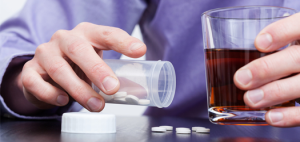
Dealing with the common cold can be a burdensome annoyance, especially when there may be limited options in terms of how to treat and manage symptoms. A visit to the doctor may or may not result in a prescription to help treat the cold, but many common colds require rest, adequate hydration, and time for healing.
Experiencing Cold Symptoms and Seeking Relief
However, when experiencing the many symptoms that come with the common cold, such as congestion, runny or stuffy nose, sore or scratchy throat, fatigue, body aches and more, finding a way to effectively manage these symptoms is often necessary to get through daily tasks and responsibilities.
Many people turn to over the counter cold medications as a quick and effective way to manage the common cold symptoms. Cold medications come in several different forms, including capsules, tablets, syrups, decongestants and more.
Visiting the neighborhood drug store in search of a cold medication can actually become quite overwhelming, as the number of products that are available are abundant.
There is essentially a product for managing any and every symptom that might possibly occur with the common cold, making it confusing for the consumer to determine what might be the best product for them.
What the Research Shows
Research has found that approximately 40 billion dollars is spent in the United States alone on the common cold, including doctor’s visits, over the counter medications and missed time from work and school.

Many individuals likely have one or more over the counter cold medication in their medicine cabinets or kitchen drawers, making the use of these substances quite frequent.
There is also a common misconception that because a substance is accessible, such as in a supermarket or drug store, that it is somehow “safer” for use that prescription medications.
The reality is that cold medications can be dangerous if misused, taken inappropriately, or if combined with other substances, such as illicit drugs, caffeine, or alcohol. Cold medications are typically not intended for chronic use and are usually recommended for managing discomforting symptoms of a cold.
Over the counter cold medications are not meant for curing any illnesses or sickness, nor are they meant for long-term purposes. Some people may become accustomed to turning towards cold medications for managing symptoms on a daily basis, partially due to the fact that these substances are so accessible.
Dangerous Mix
A potentially dangerous mix is the combination of over-the-counter cold medications with alcohol. Research from the National Institutes of Health (NIH) found that over 40 percent of Americans have reported drinking alcohol and also taking prescription medication.
While this may seem relatively harmful, the side effects of mixing alcohol with cold medications can produce adverse effects. Some of the common side effects of mixing alcohol with cold medication include dizziness, confusion, disorientation, shortness of breath, liver problems and more.
While a person may not intentionally mix alcohol with medication, it may be easy to underestimate how long a substance stays in the body.
 Some common cold medications take over 24 hours to be processed through the body’s systems, and a person might take a medication first thing in the morning and have a drink later that night unknowing that the substance is still reactive in their body.
Some common cold medications take over 24 hours to be processed through the body’s systems, and a person might take a medication first thing in the morning and have a drink later that night unknowing that the substance is still reactive in their body.
This can lead to the interaction of cold medications and alcohol, which can be dangerous depending on the type of medication taken, the quantity of alcohol consumed and other factors.
As harmless as it may seem, the combination of mixing alcohol with over the counter cold medications, such as gel tabs, cough syrups, and the like can produce life-threatening side effects. Whether done intentionally or non-intentionally, understanding the dangerous of mixing these substances can create greater awareness for best practices when taking cold medications.
If you unsure if you can have an alcoholic drink while taking a cold medication, consider waiting until you are completely off any medication that could potentially react adversely with alcohol.

About the Author: Crystal is a Masters-level Registered Dietitian Nutritionist (RDN) with a specialty focus in eating disorders, maternal/child health and wellness, and intuitive eating. Combining clinical experience with a love of social media and writing, Crystal serves as the Special Projects Coordinator for Eating Disorder Hope/Addiction Hope, where her passion to help others find recovery and healing is integrated into each part of her work.
As a Certified Intuitive Eating Counselor, Crystal has dedicated her career to helping others establish a healthy relationship with food and body through her work with EDH/AH and nutrition private practice.
The opinions and views of our guest contributors are shared to provide a broad perspective of addictions. These are not necessarily the views of Addiction Hope, but an effort to offer discussion of various issues by different concerned individuals.
We at Addiction Hope understand that addictions result from a combination of environmental and genetic factors. If you or a loved one are suffering from an addiction, please know that there is hope for you, and seek immediate professional help.
Updated & Reviewed By: Jacquelyn Ekern, MS, LPC on February 22, 2016
Published on AddictionHope.com
